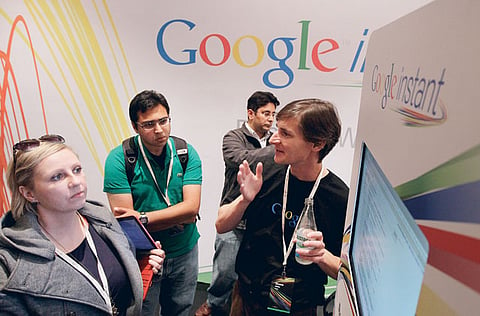Google Instant clouds future of search engine optimisation
Experts try to figure out how new scheme will affect searches

London: Is SEO — the dark art of "search engine optimisation", which usually means "Google search optimisation" — doomed following the introduction and continuing rollout of Google Instant on the planet's most-used search engine?
But also of interest is the question of what happens to all those people buying AdWords — the little text ads that come up by search results, on the top and the right-hand side.
SEO, if you don't know, is all about pushing your site further up the search results when people look for some collection of words or letters. There's a lot of "black hat" SEO (which involves things like stuffing the comments of blogs with links to your site, in the hope Google will think lots of bloggers love the pointed-to site) and there's "white-hat" stuff like many others do, which is simply trying to get yourself noticed by using the words that people are searching for prominently on your page.
Reasons why you might think SEO is cooked are: Google Instant begins offering search results as soon as you start typing; the results are different for each individual (because it depends on your web history; you only get it if you're signed in to a Google account); and the results change as your query changes, whether longer or shorter (using AJAX, the same technology that preloads Google Maps and lets you slide them around).
Impression
SEO experts have been pondering this themselves. Even with the introduction being just a few hours old, some reckon that the sky is falling. A key reason why: with Google Instant, if you pause for just three seconds while the search results are being displayed, this will count as an "impression" — which could have an effect on some pay-per-click advertisers.
At econsultancy, a number of SEO folk have offered their thoughts. Malcolm Coles of Digital Sparkle has an insightful version: "Some people are going to end up paying a lot more for PPC. If you start searching for Premier Inns, then when you get to premier you get lots of natural "premier" results (e.g. Premier League) plus one PPC ad for Premier Inns. I guess lots of people will just click that rather than carry on typing. So some brands might want to be careful that they aren't bidding on terms that get triggered too soon in the process."
Steve Rubel, who works in PR but has "digital insights", says that "what is really does is kill SEO": "Here's what this means: no two people will see the same web. Once a single search would do the trick — and everyone saw the same results. That's what made search engine optimization work. Now, with this, everyone is going to start tweaking their searches in real-time. The reason this is a game changer is feedback. When you get feedback, you change your behaviours."
However at ReadWriteWeb, there's rather less gloom and doom.
"It seems to me that the top three rankings will get even more value," says Ian Lurie, President of Portent Interactive and blogger at Conversation Marketing.
"Also, long-tail search is going to be more important, since folks can just keep typing until they see what they want."
This slightly misses the point, I suspect. The top three results will be different for everyone, and certainly in different localities. And what you can't influence, via SEO, is what Google offers you for autocomplete.
Matt Cutts of Google notes in a post on his own blog that the effect on the "long tail" of results
"The search results will remain the same for a query, but it's possible that people will learn to search differently over time. For example, I was recently researching a congressperson. With Google Instant, it was more visible to me that this congressperson had proposed an energy plan, so I refined my search to learn more, and quickly found myself reading a post on the congressperson's blog that had been on page 2 of the search results."
But what about AdWords? After all, that's part of the advertising engine that keeps Google running.
Indeed Google itself is warning, on its Analytics blog, that "With this change, you might notice some fluctuations in AdWords impression volume and in the distribution of organic keywords. For example, you may find that certain keywords receive significantly more or fewer impressions moving forward." Plus, webmasters will see more "impressions" — because Google Analytics will count it as an "impression" if a site simply appears in the search results for three seconds; there's no need for someone to actually click on the result. That is obviously going to mean some disagreement between logfiles and Google Analytics over how many people have actually gone to a site.
Over on the Google Inside AdWords blog, it explains that "Although Google Instant doesn't change the way ads are served, ads and search results will now be shown based on the ‘predicted search'. For example, if someone types ‘flow' into Google.com, our algorithms predict that the user is searching for ‘flowers' (the predicted search) and therefore display both search results and ads for ‘flowers'. However, if that user then adds the letter ‘c' to the query, our algorithms may predict that the user is searching for ‘flowchart' and show the corresponding natural and paid results for flowchart."
But note the rather cautious words here for the advertisers: "It's possible that this feature may increase or decrease your overall impression levels." In other words, even Google isn't sure how its latest invention is going to affect AdWords exactly. Not surprising, though, because it's a huge change.



